美国文学(1)殖民地时期文学 PPT
殖民主义时期的美国文学英文 ppt课件
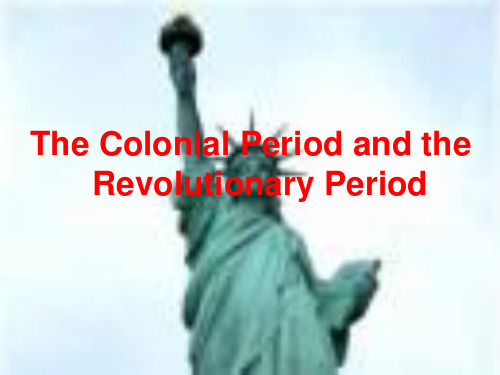
Early writers writing for freedom
• Roger Williams: the first rebel against the divine church
• John Woolman
2020/4/13
Writers in the Revolutionary Period
• William Bradford, 1st governor of Plymouth: The History of Plymouth Plantation
• John Winthrop, 1st governor of Boston, The History of New England
Their writings illustrate the religious zeal of the first settlers.
2020/4/13
III. Benjamin Franklin 1706 - 1790
1. His Life
1) Born the tenth of fifteen children in a poor candle and soap maker’s family, he had to leave school before he was eleven.
2020/4/13
Early American Puritan Poets
• Anne Bradstreet: Her poems made such a stir in England that she became known as the “Tenth Muse” who appeared in America.
11We.)EaIhnarfrlao1ylyt4uhd9nhi2odiss,tttCyoohohreryyurni:?sektwonpochwoenratCibnooelnuutmt cAbamullseedrican
美国文学介绍(殖民主义时期)
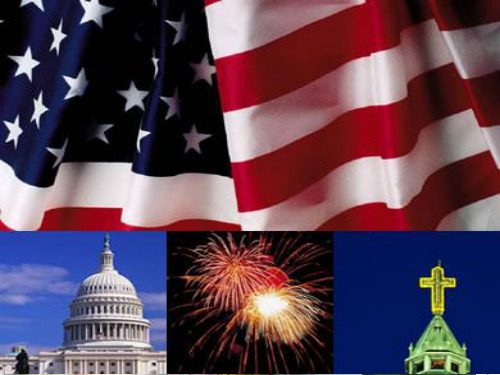
Jamestown, Virginia, in 1607
❖ Many of the people who settled in the New World came
to escape religious persecution.
Two Important New England Settlements
1948: T. S. Eliot 艾略特(USA/UK)
❖ 1980: Czeslaw Milosz
米沃什
(Poland/USA)
❖ 1987: Joseph Brodsky
布罗德斯基
(USSR/USA)
❖ Basic common qualities of American Writers: Independent,独立精神 Individualistic,个性意识 Critical,批判精神 Innovative,革新意识 Humorous,幽默风格
How to use the textbook?
❖ 1. the authors ❖ 2. the works ❖ 3. the new words ❖ 4. the related questions
The relationship between English & American Literatures?
❖ Within such a short period, American literature
swiftly developed well matured began to receive international recognition has exercised an impactful effect upon world
美国文学(1)殖民地时期文学 PPT

4. Why did Puritans come to America? (1) to reform the Church of England (2) to have an entirely new church (3) to escape religious persecution
* God’s chosen people * To seek a new Garden of Eden * To build “City of God on earth”
2) Strong Sense of Mission: Puritans dreamed of living under a perfect order and worked with a hope to build a Garden of Eden in America. This shows that they are indeed idealists.
切萨皮克湾 [Chesapeake Bay] 美国东部大西洋沿岸的海湾。南段在弗吉尼亚,北段在马里兰,长311千米,宽5~40千米 面积约8,365平方千米。有多条河流注入,其中包括萨斯奎汉纳河、帕塔克森特河、波托马 克河和詹姆斯河。詹姆斯敦是海湾区的第一个欧洲人居住区,建于1607年。一年后,J.史密 斯船长探测并绘制了海湾及其各河口的地图。切萨皮克湾的水域有丰富的海洋生物,但到20
Chapter One
Colonial Period (1607-1775)
主要内容: General background, major writers and their works
重点难点: American Puritanism and its influence on American Literature
美国诗歌选修周殖民地时期+浪漫主义早期课件 (一)
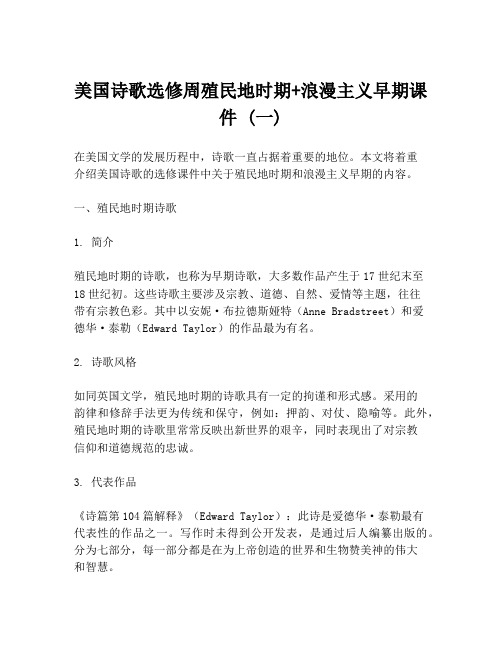
美国诗歌选修周殖民地时期+浪漫主义早期课件 (一)在美国文学的发展历程中,诗歌一直占据着重要的地位。
本文将着重介绍美国诗歌的选修课件中关于殖民地时期和浪漫主义早期的内容。
一、殖民地时期诗歌1. 简介殖民地时期的诗歌,也称为早期诗歌,大多数作品产生于17世纪末至18世纪初。
这些诗歌主要涉及宗教、道德、自然、爱情等主题,往往带有宗教色彩。
其中以安妮·布拉德斯娅特(Anne Bradstreet)和爱德华·泰勒(Edward Taylor)的作品最为有名。
2. 诗歌风格如同英国文学,殖民地时期的诗歌具有一定的拘谨和形式感。
采用的韵律和修辞手法更为传统和保守,例如:押韵、对仗、隐喻等。
此外,殖民地时期的诗歌里常常反映出新世界的艰辛,同时表现出了对宗教信仰和道德规范的忠诚。
3. 代表作品《诗篇第104篇解释》(Edward Taylor):此诗是爱德华·泰勒最有代表性的作品之一。
写作时未得到公开发表,是通过后人编纂出版的。
分为七部分,每一部分都是在为上帝创造的世界和生物赞美神的伟大和智慧。
《自传条款》(Anne Bradstreet):安妮·布拉德斯娅特是新世界首位女性诗人,她的作品充满了女性的感性情感和对宗教信仰的深厚体验。
此诗歌以回忆自己墨西哥建造的房子为主题,叙述了个人和对家庭的怀念。
二、浪漫主义早期诗歌1. 简介浪漫主义运动是19世纪初在欧洲兴起的,随后传播到美国。
浪漫主义诗歌强调个人情感体验、强烈的形象化和美感的表达。
此时期的作家包括威廉·布莱克(William Blake)和威廉·华兹华斯(William Wordsworth)等。
2. 诗歌风格浪漫主义诗歌不拘泥于传统的形式和韵律,强调自由与创新。
诗歌中常常使用比喻、暗示和形象的描写,让读者感受到个人的情感体验和内心的极致细腻。
此外,浪漫主义诗歌比较关注自然和人文,强调人与大自然的紧密联系。
美国文学 PPT课件

Benjamin Franklin Philip Freneau
➢ Chapter III American Romanticism
Washington Irving James Fenimore Cooper William Cullen Bryant Edgar Allan Poe Nathaniel Hawthorne
Brief Outline of American literature
1. Colonial period (1607-1775)
Anne Bradstreet Edward Taylor
2. Revolutionary period
(1775-1783) Benjamin Franklin Philip Freneau
The early settlers
❖ Christopher Columbus discovered the American continent in 1492.
❖ Captain John Smith reached Jamestown, Virginia in 1607.
❖ Puritans came the New England area, by Mayflower in 1620.
❖ Literature is characterized by beauty of expression and form and by universality of intellectual and emotional appeal.
2. Forms (genres) of literature? Poetry, novel (fiction), drama, prose, essay, epic, elegy, short story, journalism, ts, novelette, etc.
美国文学——殖民时期

美国文学——殖民时期殖民主义时期的文学(一)印第安人及其文学在欧洲的冒险者们登陆美洲大陆之前,美洲一直由土著印第安人所居住。
据人类学家们的推测,他们可能是在公元前8000—5000年间的冰川时代从亚洲经过了长途迁徙来到这片大陆。
他们乘坐独木舟穿越了白令海峡,经历了数千年,他们学会了种植“玉米”(Indian Corn)、白薯、可可豆、烟草等农业技术。
然而,印第安人一直处于部落社会。
他们的文学则属口头文学,其主题主要在强调人类与物质和精神世界的和谐相处,并表现了对土地的尊敬和热爱。
人们所发掘出的印第安人的文学形式有早期的典仪和曲调,也就是歌词。
由口头吟唱的神话传说在其口头文学中占有重要的地位。
印第安人用传说的形式表达对自然界的认识,讲述部落文化英雄的故事,反映印第安人对本部落传说的信念。
传说作为一种口头文学是印第安文学的一种主要形式。
讲述故事是部落里一种重要的文化活动,故事讲述者是部落里受人尊重的人,会受到全部落人的尊重。
印第安人的传说多为讲起“真实”的故事,无论是关于神话故事,还是英雄的故事都和某一真实故事有关,其教育意义是显而易见的。
简言之,北美印第安人传说文字由印第安人用自己的语言创造,以印第安人为对象,表明印第安人生活情感和思想,有着独特的印第安风格特征。
它是一个内容形式都十分丰富的综合现象,并且以口头文学的形式存在和发展着。
它与印第安人的生活有着特殊密切的关系,又具有真正意义上的“大众文学”的性质。
在欧洲人来到这片大陆,并建立殖民地之前,它是这里真正意义上的主流文学。
(二)殖民主义时期的历史背景自15世纪末哥伦布发现了美洲大陆以后,欧洲殖民者纷纷踏上这块神秘的土地。
1607年,英国人克里斯托夫·纽波特率领三艘船到达切萨比克湾,在现今的弗吉尼亚的詹姆斯顿建立了第一个永久殖民点。
1620年乘坐“五月花”船的一批清教徒在普利茅斯建立了北美的第二个殖民点。
这批因受宗教迫害而来到新大陆的新教徒们严格遵循着基督教传统教义,他们坚信自己是上帝的选民,是上帝把他们从旧世界的罪过和堕落中拯救出来,送往北美这块福地。
殖民时期的美国文学
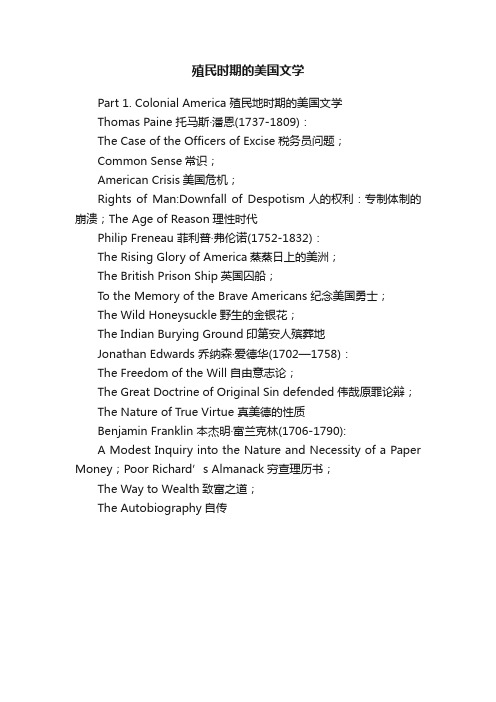
殖民时期的美国文学Part 1. Colonial America 殖民地时期的美国文学Thomas Paine 托马斯·潘恩(1737-1809):The Case of the Officers of Excise税务员问题;Common Sense常识;American Crisis美国危机;Rights of Man:Downfall of Despotism人的权利:专制体制的崩溃;The Age of Reason理性时代Philip Freneau 菲利普·弗伦诺(1752-1832):The Rising Glory of America蒸蒸日上的美洲;The British Prison Ship英国囚船;To the Memory of the Brave Americans纪念美国勇士;The Wild Honeysuckle野生的金银花;The Indian Burying Ground印第安人殡葬地Jonathan Edwards 乔纳森·爱德华(1702—1758):The Freedom of the Will自由意志论;The Great Doctrine of Original Sin defended伟哉原罪论辩;The Nature of True Virtue 真美德的性质Benjamin Franklin 本杰明·富兰克林(1706-1790):A Modest Inquiry into the Nature and Necessity of a Paper Money;Poor Richard’s Almanack穷查理历书;The Way to Wealth致富之道;The Autobiography自传。
美国文学史总结PPT课件

2019/9/12
6
John Winthrop
John Winthrop:《新英格兰历史》“The History of New England”. 1630年登上“阿贝亚”(Arbella)to Massachusetts并开始写日记keep a journal
其还是美国第一位主要作家the first major writer非凡表达能力,简洁明了,有点幽默,还是一位讽 刺天才as an author he had power of expression, simplicity, a subtle humor. He was also sarcastic.
美国早期文学主要为the narratives and journals of these settlements采用in diaries and in journals(日记和日志),他们写关于the land with dense forests and deep-blue lakes and rich soil.
2019/9/12
10
Edward Taylor
清教徒诗人中最杰出的一位the best of the Puritan poets 他的作品遵循了十七世纪中期一些杰出诗人风格和形式his work followed they
style and forms of the leading English poets of the mid-seventeenth century。 他大部分作品关于宗教的,大部分诗歌直接以赞美诗为基础进行创作的most of
2019/9/12
《殖民时期的文学》PPT课件

of taste, hardworking, thrift, tolerance and patience.
The features of the colonial American
literature
• Puritanism was central to colonial American
literature. Religious sermons became the most highly developed and the most popular of Puritan literary forms.
• The church should be restored to the
purity of the 1st church as established by Jesus Christ Himself.
• The doctrine of predestination, original sin, total
Sample of colonial reading
• Being thus arrived in a good harbor, and brought safe to land, they
fell upon their knees and blessed the God of Heaven who had brought them over the vast and furious ocean, and delivered them from the perils and miseries thereof, again to set their feet on the firm and stable earth, their proper element…
美国文学之一:美国殖民文学1

美国文学之一:美国殖民文学1美国文学之一:美国殖民文学116世纪欧洲的殖民统治者入侵北美大陆,印第安人各个部落尚处于原始公社制度的社会。
欧洲殖民者残酷地烧杀印第安人,掠夺土地,攫取兽皮,焚毁村庄,直到最后全部占领整个北美洲。
英国殖民者是北美大陆的主要统治者。
在政治上,对殖民地的统治主要是英国王室,军事、政治、财政大权掌握在总督的手里。
为了便于统治,建立了政教合一的统治方式。
在经济上,从一开始就建立在资本主义的基础上,因为北美大陆原本没有封建社会的生产关系。
虽然殖民者想建立封建生产关系,但是北美大陆土地辽阔,无法将农民固定在某片土地上。
17世纪初第一批黑人运到北美之后,黑人奴隶成为劳动力基础。
经济主要以农业为主,但是到了独立战争前夕,北部地区的几个殖民地中心城市工商业有了相当的发展。
从文化来看,是从18世纪开始出现文化活动。
1704年出现北美大陆第一张定期报纸。
1731年建立了第一个图书馆。
1752年出现第一个剧团,演出的是英国的剧本。
北美大陆的殖民文学具有如下特点:一、北美大陆的文学并不是在北美大陆本土产生发展起来,而是从英国移民带来的文化中产生发展的。
当地印第安人的文化则被严重摧残,民间的口头文学的创作完全被迫中止。
二、当时的作品,从内容上看,一方面反映了北美大陆的现实状况,描绘了印第安人的悲惨生活,殖民者的残酷统治;另一方面又歌颂了殖民者的所谓丰功伟绩。
三、当时的出版物大多是游记、日记,此外还有宗教方面的著作。
早期作品主要是在英国出版。
到了独立战争时代,文学主要形式发生变化,主要有诗歌、民歌、政论、演说等,小说和戏剧还没有产生具有美国民族自己特点的作品。
北美大陆的诗歌创作,反映了当时的精神特点。
北美出版的第一部诗集是《海湾圣诗》(1640年),这是一部民歌体圣诗集,从希伯来语翻译成为英文。
安妮.布雷兹特里特(1612-1672 年),是北美大陆第一个出版诗集的诗人。
她的父亲和丈夫都当过总督。
殖民地时期美国文学PPT课件
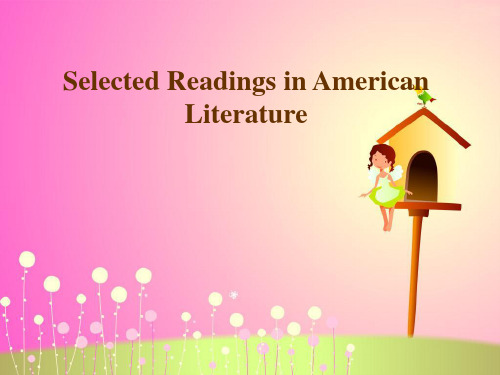
9. The Post-war Scene
Saul Bellow Salinger
Poetry: Confessional Poetry Black Mountain Poets San Francisco Renaissance The Beat Generation The New York Poets
from Europe, esp. from England.
2. early history: ▪ 1) America was first discovered by Columbus at
the end of the 15th century. ▪ 2) In 1607, Captain John Smith led some
Englishmen across the ocean (Jamestown, Virginia) ▪ 3) In 1620, 102 passengers sailed on the ship Mayflower across the sea and settled on the new continent “New England”. (Plymouth, Massachusetts)
* God’s chosen people * To seek a new Garden of Eden * To build “City of God on earth”
5. What is the Puritanism?
Puritanism is a religious and political movement that developed in England about the middle of the 16th century and later spread influence into the New England in America. Puritanism was a logical aftermath of the Renaissance, the Reformation, the establishment of the Church of England, and the growth of Presbyterianism (a.[宗]长老会(制)的). Through these movements, one sees emerging the right of the individual to political and religious independence.
美国文学史-殖民时期Rev[1].
![美国文学史-殖民时期Rev[1].](https://img.taocdn.com/s3/m/c22f5753ccbff121dc368304.png)
The style
Diction: simple and concise Syntax: simple and short sentence Parallel The use of “and”
What are the Classics of Chinese culture Si Shu (四书) The Great Learning 《大学》 The Doctrine of the Mean 《中庸》 The Analects of Confucius 《论语》 Mencius 《孟子》
Compare the following paragraphs:
And Adam knew Eve his wife; and she conceived,and bare Cain, and said, I have gotten a man from the LORD. And she again bare his brother Abel. And Abel was a keeper of sheep, but Cain was a tiller of the ground. And in process of time it came to pass, that Cain brought of the fruit of the ground an offering unto the LORD. And Abel, he also brought of the firstlings of his flock and of the fat thereof. And the LORD had respect unto to Abel and to his offering; But unto Cain and to his offering he had not respect. And Cain was very wroth, and his countenance fell.` (Genesis)
The Colonial period of American Literature1 殖民主义时期

The Colonial period of American LiteratureObjectives:1. Help the students to get a brief view on the background of American literature2. Explain the religious background and Puritanism3. The influence of Puritanism upon AmericaMajor Points:1. Early history of America2. Religious background and Puritanism3. The influence of Puritanism upon America1. Early history:1) America was first discovered by Columbus at the end of the 15th century.2) In 1607, Captain John Smith led some Englishmen across the ocean3) In 1620, 102 passengers sailed on the ship Mayflower across the sea and settled on the new continent ―New England‖.2. Aims (Why did Puritans come to America?)1) to reform the Church of England2) to have an entirely new church3) to escape religious persecution3. Religious belief (religion): Christianity—Puritanism1) They follow the ideas of the Swiss reformer John Calvin.2) Doctrines: Predestination 宿命论Original sin and total depravity (human beings are basically evil.)Limited atonement (or the Salvation of a selected few)3) Puritan values (creeds):Hard work, thrift, piety, sobriety, simple tastes.Puritans are more practical, tougher, and to be ever ready for any misfortune and tragic failure. They are optimistic.4) American Puritanism was one of the most enduring shaping influences in American thought and American literature.The first writings in American literature were the narratives and journals of the early colonial settlements. The first permanent English settlement in North American was established at James Town, Virginia in 1617.John Smith wrote about the exploration in A True Relation of Such Occurrences and Accidents of Note as Hath Happened in Virginia Since the First Planting of that Colony and became the first American writer. His other important writings include A Map of Virginia; with a Description of the Country and General History of Virginia, which include his famous tale of how the Indian princess Pocahontas saved him from the anger of her father Powhatan. His writings were filled with themes, myths, images, scenes, characters and event that were a foundation of American literature and helped lure the Pilgrim and Puritans to flee from the Old world (Europe) to a New Israel, a New Promised Land (the American Continent)History was an important form of literature in the colonial times. Besides John Smith, William Bradford produced his lasting work The History of the Plymouth Plantation and John Winthrop, The History of New England. New England had produced a literature of ideas: theological, moral, historical, political. The Puritans came to New England for the sake of religious freedom. Puritanism is the religious belief of the Pu ritans, who had intended to ―purify‖ or simplify the religious rituals of the Church of England. They believed in the original sin and the harsh Day of Doom, although some good people --- the chosen people or ―the Elect‖ --- may be saved. The Puritans in New England practiced theocracy, a form of government in which religion and government are combined into one. Their way of life was based on their somber religion and stressed hard work, thrift, piety and sobriety. These Puritan values greatly influenced the writings of such noted Puritan clergymen as John Cotton and Cotton Mather and the first American Poetess Anne Bradstreet. Her first published workis a collection of poems entitled The Tenth Muse Recently Sprung Up in America. Another famous Puritan poet wasEdward Taylor.William Bradford (1590-1657)William Bradford was elected governor of Plymouth in the Massachusetts Bay Colony shortly after the Separatists landed. He was a deeply pious, self-educated man who had learned several languages, including Hebrew, in order to ―see with his own eyes the ancient oracles of God in their native beauty.‖ His participation in the migration to Holland and the Mayflower voyage to Plymouth, and his duties as governor, made him ideally suited to be the first historian of his colony. His history, Of Plymouth Plantation(1651), is a clear and compelling account of the colony’s beginning. His description of the first view of America is justly famous:Being thus passed the vast ocean, and a sea of troubles...they had now no friends to welcome them nor inns to entertain or refresh their weatherbeaten bodies; no houses or much less towns to repair to, to seek for succor...savage barbarians...were readier to fill their sides with arrows than otherwise. And for the reason it was winter, and they that know the winters of that country know them to be sharp and violent, and subject to cruel and fierce storms...all stand upon them with a weatherbeaten face, and the whole country, full of woods and thickets, represented a wild and savage hue.Bradford also recorded the first document of colonial self-governance in the English New World, the ―Mayflower Compact,‖ drawn up while the Pilgrims were still on board ship. The compact was a harbinger of the Declaration of Independence to come a century and a half later.Puritans disapproved of such secular amusements as dancing and card-playing, which were associated with ungodly aristocrats and immoral living. Reading or writing ―light‖ books also fell into this category. Puritan minds pour ed their tremendous energies into nonfiction and pious genres: poetry, sermons, theological tracts, and histories. Their intimate diaries and meditations record the rich inner lives of this introspective and intense people.Anne Bradstreet (c. 1612-1672)The first published book of poems by an American was also the first American book to be published by a woman -- Anne Bradstreet. It is not surprising that the book was published in England, given the lack of printing presses in the early years of the firs t American colonies. Born and educated in England, Anne Bradstreet was the daughter of an earl’s estate manager. She emigrated with her family when she was 18. Her husband eventually became governor of the Massachusetts Bay Colony, which later grew into the great city of Boston. She preferred her long, religious poems on conventional subjects such as the seasons, but contemporary readers most enjoy the witty poems on subjects from daily life and her warm and loving poems to her husband and children. She was inspired by English metaphysical poetry, and her book The Tenth Muse Lately Sprung Up in America (1650) shows the influence of Edmund Spenser, Philip Sidney, and other English poets as well. She often uses elaborate conceits or extended metaphors. ―To My Dear and Loving Husband‖ (1678) uses the oriental imagery, love theme, and idea of comparison popular in Europe at the time, but gives these a pious meaning at the poem’s conclusion:If ever two were one, then surely we.If ever man were loved by wife, then thee;If ever wife was happy in a man,Compare with me, ye women, if you can.I prize thy love more than whole mines of goldOr all the riches that the East doth hold.My love is such that rivers cannot quench,Nor ought but love from thee, give recompense.Thy love is such I can no way repay,The heavens reward thee manifold, I pray.Then while we live, in love let s so persevereThat when we live no more, we may live ever.General ways to approach Anne Bradstreet’s poems:Check out her meter (iambic pentameter) and look for key variations in rhythm and in syntax. Ordinarily any variation from the norm set up points to special rhetorical effect or emphasis.Edward Taylor (c. 1644-1729)Like Anne Bradstreet, and, in fact, all of New England’s first writers, the intense, brilliant poet and minister Edward Taylor was born in England. The son of a yeoman farmer -- an independent farmer who owned his own land -- Taylor was a teacher who sailed to New England in 1668 rather than take an oath of loyalty to the Church of England. He studied at Harvard College, and, like most Harvard-trained ministers, he knew Greek, Latin, and Hebrew. A selfless and pious man, Taylor acted as a missionary to the settlers when he accepted his lifelong job as a minister in the frontier town of Westfield, Massachusetts, 160 kilometers into the thickly forested, wild interior. Taylor was the best-educated man in the area, and he put his knowledge to use, working as the town minister, doctor, and civic leader.Modest, pious, and hard-working, Taylor never published his poetry, which was discovered only in the 1930s. He would, no doubt, have seen his work’s discovery as divine providence; today’s readers should be grateful to have his poems -- the finest examples of 17th-century poetry in North America.Taylor wrote a variety of verse: funeral elegies, lyrics, a medieval ―debate,‖ and a 500-page Metrical History of Christianity (mainly a history of martyrs). His best works, according to modern critics, are the series of short Preparatory Meditations.Questions:1. What are the doctrines of American Puritanism?2. What are the influences of Puritanism upon America and American literature?3. What contributions did the Puritans made to American literature?THE AMERICAN ENLIGHTENMENTThe 18th-century American Enlightenment was a movement marked by an emphasis on rationality rather than tradition, scientific inquiry instead of unquestioning religious dogma, and representative government in place of monarchy. Enlightenment thinkers and writers were devoted to the ideals of justice, liberty, and equality as the natural rights of man. While theology dominated the writings of the colonial times, politics permeated the writings of the Revolution period. Thomas Paine’s Common Sense, The A merican Crisis, The Federalist Papers and the Declaration of Independence drafted by Thomas Jefferson are good examples of the fierce rhetorical and eloquence of the political writings at that period.The Enlightenment, a literary movement originated from Europe had influenced the best writers of the period. In Europe, thinkers of the Enlightenment emancipated or enlightened people’s mind from the bondage of feudalistic chains of the Middle Ages, While in America the humanistic ideas of the movement dealt a heavy blow to Puritanism in advocating science, knowledge and the power and ability of man. The Enlightenment had also influenced the literature of that period in forming a style of clarity and precision.After the United Sates achieved its independence, American intellectuals set out on the journey to a literary independence. In 1783, Noah Webster declared, ―America must be as independent in literature as she is in politics, as famous for the arts a s for arms.‖ Jefferson’s Notes on the State of Virginia a nd Bartram’s Travels carried the same notion. Yet American literature throughout the century was largely patterned on the writings of eighteenth-century English writers, notably Franklin by Addison and Steele and Joel Barlow by Alexander Pope.Benjamin Franklin (1706-1790)Benjamin Franklin, whom the Scottish philosopher David Hume called America’s ―first great man of letters,‖ embodied the Enlightenment ideal of humane rationality. Practical yet idealistic, hard-working and enormously successful, Franklin recorded his early life in his famous Autobiography. Writer, printer, publisher, scientist, philanthropist, and diplomat, he was the most famous and respected private figure of his time. He was the first great self-made man in America, a poor democrat born in an aristocratic age that his fine example helped to liberalize.Franklin was a second-generation immigrant. His Puritan father, a chandler (candle-maker), came to Boston, Massachusetts, from England in 1683. In many ways Franklin’s life illustrates the impact of the Enlightenment on a gifted individual. Self- educated but well-read in John Locke, Lord Shaftesbury, Joseph Addison, and other Enlightenment writers, Franklin learned from them to apply reason to his own life and to break with tradition -- in particular the old-fashioned Puritan tradition -- when it threatened to smother his ideals.While a youth, Franklin taught himself languages, read widely, and practiced writing for the public. When he moved from Boston to Philadelphia, Pennsylvania, Franklin already had the kind of education associated with the upper classes. He also had the Puritan capacity for hard, careful work, constant self- scrutiny, and the desire to better himself. These qualities steadily propelled him to wealth, respectability, and honor. Never selfish, Franklin tried to help other ordinary people become successful by sharing his insights and initiating a characteristically American genre -- the self-help book.The emphasis on commercial success in these and many more proverbs explains why Franklin has come down in American history as the perfect representative of the now so much discredited American Dream of ―rags to riches‖. But although the great majority of Poor Richard’s saying do stress the importance of working hard to mak e money and saving to reinvest it, so as to make more, Franklin himself was actually as far above the average bourgeois in his basic sense as in ability.He did accept the idea that happiness depended in the first place on economic success and he did optimistically believe that this was within the grasp of any normal American who worked hard, lived modestly and remain alert to seize every opportunity for practical advancement. And although he strongly condemned dishonest business practices --- in the long run, he said, ―Honesty is the best policy‖. He was also convinced that no man could be happy unless he did his best to improve the life of his society as well as his own life. Thus he himself spent time and energy to found the first lending library in the colonies while he was struggling to establish his own small print shop. And he was even more unusual in his creative lifelong devotion to scientific advance.Unlike the self-made successful businessman Franklin thought although making money was the necessary foundation for a happy life, wealth was far from the whole or even the major purpose of that life. At forty-two, when he had built a business which, shared with a working partner, could assure his family a comfortable income of five hundred pounds a year, Franklin retired. He planned to devote the rest of his life to such scientific experiments as the famous one with the kite which helped determine the nature of lightning and electricity. However the mid-century political situation made other demands upon him.First deeply involved in such volunteer social activities as the founder of the American Philosophical Society, planning the University of Pennsylvania and organizing the first free hospital in the colonies, he soon became active in national and even international political affairs.The shrewd humor and good nature so apparent in the autobiography and Poor Richard’s Almanac are part of the model he sets for the new American --- A model of democratic easy going practical individualism.Ben Franklin was an inventor not only of things, but also of ideas. First come of the things. Ben Franklin invented lightning rod; He created the first wood stove with a pipe out the back that extended through the wall. You may say: In his time, the Franklin stove produced for more heat than the fireplace, cost less to operate, was less smoky, and became popular all over the world. Franklin also published America’s first magazine and organized its first postal service and its first lending libr ary. Ben Franklin was also famous --- still is, 200 some years after his death --- for his witty observations, like Keep your eyes wide open before marriage, half-shut afterwards.‖ Or, ―There never was a good war or a bad peace.‖ Another one: ―In this world nothing is certain bu t death and taxes.‖It was he who put the ―self-evident’ in its most famous line -- ―We hold these truths to be self-evident, that all men are created equal.‖ And when it appeared that new United States may not be able to win its war against Britain, it w as old Ben, in his seventies, who was dispatched to Paris and talked the French into sending soldiers and ships to help the Americans -- help without which American today might well be a member of the British Commonwealth. It must be noted, he was pursuing, apparently with considerable luck.He died at 84. Of all his sayings, he seems to have lived up to this one the best: If you would not be forgotten, as soon you are dead and rotten, either write things worth reading, or do things worth the writing.Poor Richard’s AlmanackFranklin’s Poor Richard’s Almanack, begun in 1732 and published for many years, made Franklin prosperous and well-known throughout the colonies. In this annual book of useful encouragement, advice, and factual information, amusing charac ters such as old Father Abraham and Poor Richard exhort the reader in pithy, memorable sayings. In ―The Way to Wealth,‖ which originally appeared in the Almanack, Father Abraham, ―a plain clean old Man, with white Locks,‖ quotes Poor Richard at length. ―A Word to the Wise is enough,‖ he says. ―God helps them that help themselves.‖ ―Early to Bed, and early to rise, makes a Man healthy, wealthy, and wise.‖ Poor Richard is a psychologist (―Industry pays Debts, while Despair encreaseth them‖), and he always counsels hard work (―Diligence is the Mother of Good Luck‖). Do not be lazy, he advises, for ―One To-day is worth two tomorrow.‖ Sometimes he creates anecdotes to illustrate his points: ―A little Neglect may breed great Mischief....For want of a Nail the Shoe was lost; for want of a Shoe the Horse was lost; and for want of a Horse the Rider was lost, being overtaken and slain by the Enemy, all for want of Care about a Horse-shoe Nail.‖ Franklin was a genius at compressing a moral point: ―What maintains one Vice, would bring up two Children.‖ ―A small leak will sink a great Ship.‖ ―Fools make Feasts, and wise Men eat them.‖AutobiographyFranklin’s Autobiography is, in part, another self-help book. Written to advise his son, it covers only the early years. The most famous section describes his scientific scheme of self- improvement. Franklin lists 13 virtues: temperance, silence, order, resolution, frugality, industry, sincerity, justice, moderation, cleanliness, tranquility, chastity, and humility. He elaborate s on each with a maxim; for example, the temperance maxim is ―Eat not to Dullness. Drink not to Elevation.‖ A pragmatic scientist, Franklin put the idea of perfectibility to the test, using himself as the experimental subject.To establish good habits, Franklin invented a reusable calendrical record book in which he worked on one virtue each week, recording each lapse with a black spot. His theory prefigures psychological behaviorism, while his systematic method of notation anticipates modern behavior modification. The project of self-improvement blends the Enlightenment belief in perfectibility with the Puritan habit of moral self-scrutiny.Franklin saw early that writing could best advance his ideas, and he therefore deliberately perfected his supple prose style, not as an end in itself but as a tool. ―Write with the learned. Pronounce with the vulgar,‖ he advised. A scientist, he follo wed the Royal (scientific) Society’s 1667 advice to use ―a close, naked, natural way of speaking; positive expressions, c lear senses, a native easiness, bringing all things as near the mathematical plainness as they can.‖Despite his prosperity and fame, Franklin never lost his democratic sensibility, and he was an important figure at the 1787 convention at which the U.S. Constitution was drafted. In his later years, he was president of an antislavery association. One of his last efforts was to promote universal public education.THE POLITICAL PAMPHLET: Thomas Paine (1737-1809)T he passion of Revolutionary literature is found in pamphlets, the most popular form of political literature of the day. Over 2,000 pamphlets were published during the Revolution. The pamphlets thrilled patriots and threatened loyalists; they filledthe role of drama, as they were often read aloud in public to excite audiences. American soldiers read them aloud in their camps; British Loyalists threw them into public bonfires.Thomas Paine is a ―Great Commoner of Mankind‖, a most important revolutionary activist and political writer during the War of Independence and the French Revolution.Important works: Common Sense: A famous pamphlet appeared in 1776, which boldly advocates a ―Declaration for Independence and brings the separatist agitation to a crisis. The American Crisis: A serial of sixteen pamphlets during the War (1776-17830) that greatly restored the morale and inspired the fighting spirit of the soldiers and people of North America in times of difficulties and contained many unforgettable sentences .Writing Style: His pamphlets are succinct, powerful, persuasive and aphoristic.Important selected reading:(1) These are the times that try men’s souls: The summer soldier and the sunshine patriot will in this crisis, shrink from the service of their country; but he that stands it Now, deserves the love and thanks of men and women.(2) Tyranny, like hell, is not easily conquered; yet we have this consolation with us, that the harder the conflict, the more glorious the triumph. What we obtain too cheap, we esteem too lightly.Thomas Paine ranks among the most important American prose writers of the eighteenth century. In 1774 he arrived in Philadelphia, where he edited the Pennsylvania Magazine, and contributed to other periodicals. On January, 10, 1776, his Common Sense was published anonymousl y, which boldly advocated a ―Declaration for Independence.‖Although he had little formal education, he attained, from his wide reading, universal and profound knowledge of philosophy, political theory, and natural science. Knowledge is insight. Paine’s k nowledge, political sensibility, and literary talent enable him to utter an important social issue urgently requiring attention and expression. Common Sense sold a hundred thousand copies within three months, and preprinted abroad; its power and influence electrified the Americans to see the necessity to have an independent nation of their own. When the war was over, he returned to Europe in 1789, where he took part in the early activities of the French Revolution, and became associated with radical movements in England. In addition, Paine continued to write. The Age of Reason expressed his deistic view of religion. His other major work included The Rights of Man, an answer to Burke’s Reflection on the Revolution in France.The prose work of Thomas Paine, along with that of Franklin and Jefferson, exhibited the eighteenth century concepts of the nature and function of literary art, it was characterized by a style incomparably smooth and lucid yet vigorous and eloquent, and by a structure that was logical and crystal-clear. Besides exemplifying rationalism, order, neoclassic simplicity, utilitarian tendency, and other major predication of the literary theory of the age, his prose lies in the sincerity and passion of his unshakable belief in the rights of the humblest man as well as in the fiery ardor and determination of his words.Thomas Jefferson (1743-1826)Life achievement: an important revolutionary statesman during the American War of Independence, the main drafter of the declaration of Independence, and the third president of the United Sates. His democratic ideas have run into the veins of the American people generation after generation.Life Philosophy: Influenced by Voltaire, John Locke and other writers and philosophers of the Enlightenment, he was a fervent believer and advocator of democracy, liberty and selfhood. He held that the natural rights of man must be secured by law inalienably for all, irrespective of station, and that government, a necessary evil, should be established only with the common consent of a social contract and can govern only with the consent of the governed.Important selected readingsWe hold these truths to be self-evident, that all men are endowed by their Creator with certain unalienable Rights, that among these are Life, Liberty and the pursuit of Happiness. --- That to secure these rights, Governments are instituted among men, deriving their just powers from the consent of the governed, --- That whenever any form of Government becomes destructive of these ends, it is the R ight of the People to alter or to abolish it, and to institute new government…Thomas Jefferson has been taken as one of the most versatile and enlightened men of his generation. Upon graduation from William and Mary College, he practiced law for a short time, however, he soon gave it up, and threw himself into public life, which provided a forum for him to display his genius as political leader.A member of the Continental Congress, principal author of the Declaration of Independence, Governor of Virginia, Minister to France, Secretary of State, Vice president, and President, all these titles manifest his successful career. Besides his accomplishment in politics, Jefferson possessed astonishingly rich knowledge which embraced such diverse fields as classical learning and literature, natural science, agriculture, architecture, and education.Jefferson was so productive that his writings may run to fifty volumes, although he only published eight titles in his lifetime. As to his literary reputation, Jefferson is famous for his masterly prose style that is classically spare, and remarkable in ease, simplicity, and power. The Declaration of Independence exemplified his simple and clear, powerful and graceful style that has been widely admired. Notes on the States of Virginia (1784), has been his only work that can be called a book, consisted of twenty-three sections, dealing with such topics as natural resources, geography, landscape, inhabitants, slavery, government, law, education, religion, and social customs. It was a veritable storehouse of human ideas and liberal democracy, its inspiring and stimulating power touched both the American and the European. Its French translation appeared in 1786.One of the most eloquent spokesmen of American ideas, Jefferson exhibited in his various kinds of writings his faith in the absolute authority of reason, his deistic philosophy, his love for classical literature, and his interest in natural science. In addition to his neoclassical prose style that has gained him a position in the history of American literature, Jefferson has been admired particularly for his social philosophy oriented toward the equal rights of man and the rational happiness of the individual, as he stated in a letter to Benjamin Rush: ―I have sworn upon the altar of God, eternal hostility against every form of tyranny over the mind of man.‖Philip Freneau (1752-1832)Life achievement: Philip Freneau was the first important American poet. He was transitional literary figure from the Enlightenment to the Romantic period.His subject matter, themes and style: Philip Freneau was neoclassical by training and taste and yet romantic in essential spirit. He was also at once a satirist and sentimentalist, a humanitarian but also a bitter polemicist, a poet of Reason yet the celebrant of ― lovely fancy‖, a deistic optimist most inspired by themes of death and transience. His close observation of nature distinguished his treatment of the native wild life and other native American subjects. He developed a natural, simple style with concrete diction.Important poems: ―The British Prison Ship‖: It is a poetic narrative of his bitter experience of captivity during the War of Independence and the best example of his political poems. ―The Wild Honey Suckle‖: It is Philip Freneau’s most widely read natural lyric with the theme of transience. The central image is a native wild flower, which makes a drastic difference from elite flower images typical of traditional English poems. The Indian Burial Ground‖: It is another poeti c description of native subjects --- the Indians. In this poem, beauty, fancy, awe, death and eternity are harmoniously interwoven.A poet who has been called the ―Father of American Poetry‖, Philip Freneau played an unique transitional role between the neoclassicism in the second half of the eighteenth century and the romanticism in the first quarter of the nineteenth. Besides his success in poetry, Freneau was also active in public life, his ideal of establishing an independent and democratic。
1 The Literature of Colonial America殖民时期的美国文学

❖ “就这样渡过了浩瀚的大洋,经历了筹备远 航期间无尽的困苦......,现在没有朋友来迎接 他们,没有小旅馆让他们歇一歇饱经风霜的 身子,没有人家更没有小镇可供投靠求 助。......极目所见,只是野人野兽遍布的蛮 荒, 而野人野兽究竟有多少,他们无法知 道。”
❖ 途径浩洋,烦扰如浩洋者亦何其多哉! 登陆之时,无亲朋之恭候,无馆驿以洗 尘,无房屋以容栖,无城镇以所图之助 也。然有之者,远目所及者,乃蛮荒之 僻壤,遍野之野人野兽,且其数不可量 也。 (译文出自10级某同学)
The final examination (50%)
❖ 考试内容:有关文学史知识及一些文学作品的解读 与欣赏,涵盖教材与授课内容。
❖ 考核的试题类型与分值比例: I. Literary Terms(15%), II. Match the names of the writers with their works (10%) III. Multiple Choice (30%), IV. Identification and interpretation of some excerpts of literary works(20%) V. Essay questions (25%)
Historical background
❖ the first settlers in American continent
American Indians, tribes
❖ great geographic discoveries in 15th century
1492, Christopher Columbus 1497, John Cabot sent by King Henry of England
Chapter one The Literature of Colonial America
- 1、下载文档前请自行甄别文档内容的完整性,平台不提供额外的编辑、内容补充、找答案等附加服务。
- 2、"仅部分预览"的文档,不可在线预览部分如存在完整性等问题,可反馈申请退款(可完整预览的文档不适用该条件!)。
- 3、如文档侵犯您的权益,请联系客服反馈,我们会尽快为您处理(人工客服工作时间:9:00-18:30)。
Historical Introduction
1 early history:
1) America was first discovered by Columbus at the end of the 15th century. 2) In 1607, Captain John Smith led some Englishmen across the ocean (Jamestown, Virginia) 3) In 1620, 102 passengers sailed on the ship Mayflower across the sea and settled on the new continent “New England”. (Plymouth, Massachusetts)
The Great Discovery of the New Land in 1492 by Columbus
Henry VII, King of England, established in 1497 a claim to the continental domain.
Queen Elizabeth came to the throne of England in 1558, began to take a serious interest in the real estate in the New World.
American literature is the literature produced in American English by American citizens.
Canon of literature concurrence of ciritcs persistent influence frequent reference to an author or work wildspread assignment ideology, political interest and value of elite class
Under her encouragement, many merchants and sailors had begun their exploring journeys into the New Land.
Among them, there was a person named Captain John Smith.
美国文学(1)殖民地时期文学
Table of Contents
➢Table of Contents ➢Introduction ➢Brief Outline of American
Literature ➢Chapter I Colonial Period
Introduction
American Literature
Historical Overview
•Colonial Period (1607-1765) 殖民时期 •Enlightenment & the War of Independence (17651800)启蒙时期 •Romantic Period(1800-1865)浪漫主义时期 •Realistic Period (1865-1918) 现实主义时期 •Modernism (1918-1945) 现代主义时期 •Contemporary Literature (1945- ) 当代文学
the founding of Jamestown in Virginia in 1607.
3. What is the Puritan? (p7-9)
Puritan is English protestant.They regarded the reformation of the Church under Elizabeth as incomplete, and called for its further “purification” from what they considered to be unscriptural and corruptforms and ceremonies retained from the unreformed church.
3. What is the Puritanism? (p7-9)
Puritanism is a religious and political movement that developed in England about the middle of the 16th century and later spread influence into the New England in America.
2.people: Indians were native inhabitants. Now Americans are mainly immigrants mostly from Europe, esp. from England.
大家学习辛苦了,还是要坚持
继续保持安静
The Colonization
Chapter One
Colonial Period (1607-1775)
主要内容: General background, major writers and their works
重点难点: American Puritanism and its influence on American Literature
The 17th century American Puritans included two parts:
one part of them were the creators of the Plymouth(普利茅斯 ) colony, called “Separatists”.
The other part was the Englishmen in the Massachusethan those of Plymouth colony, they were richer and better-educated.
